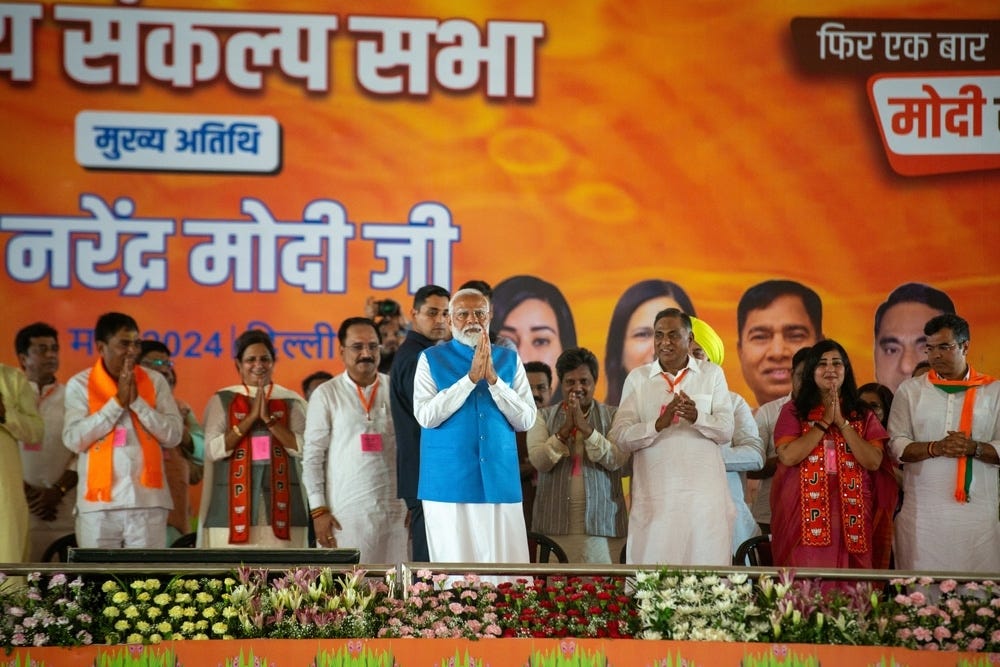Shock Indian election results: Modi set to lose majority
Early counting from the biggest election in world history offers an unexpected outcome. India's Modi will fall short of a majority.
Indian stock markets tumbled to their lowest level in four years today after early counting from the biggest election in world history offered an unexpected outcome: the landslide victory anticipated for Indian Prime Minister, Narendra Modi, amid a rising tide of Hindu nationalism, has failed to materialise.
Early results from India’s national elections indicate that Modi’s Bharatiya Janata party is set to lose its outright majority, forcing the 73-year-old prime minister to rely on smaller allies to secure a historic third term.
Results are the culmination of a 44-day long voting process in which one in eight of the world’s adult population were eligible to cast their ballot. A democratic exercise of extraordinary scale.
Yesterday, there was a stellar market rally after exit polls suggested Modi could been on course to win a super-majoirty, potentially even realising his declared aim of advancing the BJP from its current 303 parliamentary seats to 400.
Today, as counting got underway, a different picture soon emerged. The opposition INDIA alliance, led by the Indian National Congress, has performed much better than expected.
The BJP looks on course to take around 240 seats out of the 543 in India’s lower house, falling short of the outright majority it won on its own at the previous two general elections. And, after ten hours of counting, Modi’s BJP-led alliance was ahead in around 294 seats, maintaining a lead of just over 60 seats over the INDIA alliance.
This is a major boost to the Congress party, which leads the opposition alliance and has been widely seen as a waning political force in India. It seems Rahul Ganhdi, the face of Congress, has been unfairly dismissed. Despite his esteemed family ties as the great-grandson of Jawaharlal Nehru, India’s first prime minister, Ganhdi was generally deemed an unlikely figure to restore the party’s fortunes.
Modi is also contending with some deeply symbolic losses. The BJP has, for instance, lost a seat in the Ayodhya constituency, where Modi opened a grand but highly controversial Hindu temple back in January. The temple – a spot where he campaigned heavily – is dedicated to the Hindu god Lord Ram but built on the ruins of a 16th-century mosque torn down by a Hindu mob in 1992.
Yesterday’s early exit polls stoked fears that an emboldened Modi would use his newfound “super-majority” to chuck out India’s constitution, transform the country from a secular state into a Hindu one and ramp up his attacks on India’s Muslim population.
But the lack of a majority for BJP means Modi will almost certainly lack the sweeping powers to alter the constitution. Instead, the country is likely to be led by a much more negotiated government.
As for the economic implications, Mumbai’s markets have taken a tumble because, during the pro-market PM’s decade in power, the country’s business elite has seen huge increases in wealth and India has overtaken China as the world’s fastest growing economy.
Yet wealth is concentrated in the hands of relatively few: in terms of GDP per capita India ranks 140th globally. Almost 20 per cent of its population – 280 million people – have no lavatory facilities while 10 per cent live below the poverty line.
Whatever shape government Modi ends up leading, as Reaction’s Editorial Board wrote previously, he must use his third term to reduce the vast inequalities of wealth that threaten national unity as much as sectarianism.
Write to us with your comments to be considered for publication at letters@reaction.life



